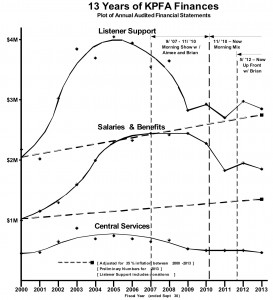Report of the Executive Director to the Pacifica National Board
by Summer Reese
April 27, 2014

Summer Reese in discussion with some of those occupying the Pacifica Office. L to R, Geneva Reese, Cynthia Johnson, Summer Reese, Virginia Browning, & Daniel Borgstrum
The following is my report on the status of major issues and concerns currently facing Pacifica Foundation Radio during the crisis that has been created by the actions of the board majority. The reckless and illegal actions of the majority have caused considerable concern to our many creditors, who are now uncertain about the organization’s stability and ability to meet its financial obligations over time. This has resulted in two collections actions being filed against the Foundation this month by creditors that were previously working with staff on payment of these liabilities. The lawsuit with which we have been served is from Robert Half, the temp
firm which has supplied us with some of our accounting staff. The other lawsuit is from FSRN and we have not yet been served in that action. When we are served, I will notify the board.
Additionally, the SAG-AFTRA unit in Washington, D.C. has filed a complaint with the National Labor Relations Board (NLRB). On March 13, 2014, I flew to Washington, D.C., to meet with the Collective Bargaining Unit and the representatives of the union to address grievances and potential grievances generated by the conduct of the interim General Manager at WPFW. All matters were addressed on that day, a schedule of addressing concerns going forward was agreed to, and the union was not planning on filing any further grievances against the organization, much less complaints with the NLRB, which is a drastic escalation. Later, on the night of March 13, 2014, the board majority took its illegal vote to allegedly fire me, and the result has been that we are now facing major labor charges before the NLRB.
The audit work continues, despite the lack of cooperation from KPFA. The Business Manager of that unit has still failed to reconcile her books, but has finally agreed to release the underlying documents, such as bank statements, so that accounting staff in the National Office can reconcile that unit’s books. The request to that office to simply release the underlying documentation, if the BM [Business Manager] was unable to perform her job duties, was made two months ago, and if the records had just been released at that time, we would have been able to avoid the postponement of the audit.
Because of the delay in the audit work, it is unlikely that any CPB funds will be released this fiscal year, as the year will be nearly over before the organization’s audit and tax return are completed. The auditors are beginning field work at the National Office in May.
Last year’s fatally flawed 990 tax return, as prepared by the then CFO, Raul Salvador, has been amended and sent to me this week for final review and approval. I anticipate signing the amended return this week, so that we may file it with the IRS and the various states requiring our financial filings in order to solicit funds from the public in those states.
The rehired CFO, Raul Salvador, is currently on vacation in the Philippines.
WBAI continues to struggle financially and is facing catastrophic consequences if the financial situation at that unit is not rapidly addressed. The transmitter tower rent has not been paid for March or April, and the station is currently a quarter of a million dollars in arrears on operating expenses.
Both WBAI and WPFW were unable to meet their respective payroll obligations this week, as well as their healthcare obligations. KPFA and KPFK have had to supply approximately $85,000.00 to meet the funding shortfalls at the two East Coast stations, as well as the National Office, which continues not to receive Shared Services monies from those stations as budgeted.
Work on the audit, as well as day to day operations at the National Office continues relatively normally, despite the physical violence, interference and attempts to block access to the office by Margy Wilkinson and her supporters. We have been able to protect the employees, stop the attempted illegal lock-out of the staff and withstand assaults upon the operations, such as turning off the water so that staff could not use the legally required facilities of the bathroom, etc.
We have hired two temporary accounting staff to assist with the audit preparation, and despite the above attempted disruptions, all staff have been able to perform their normal duties and have been putting in incredible hours and effort to complete the audit, even with the delays caused by the lack of cooperation by a particular unit.
I was temporarily removed from payroll, but the issue appears to be resolved at this point, and should not necessitate a filing on my part with the Department of Industrial Relations.
Full compliance with the Communications Act by the five stations, as required for CPB funding, is still a struggle. WBAI and WPFW still have lapses in meeting notice postings, which will continue to adversely impact complete organizational compliance until fully resolved.
 During this crisis, I continue to work with the legal counsel of The Office of The Inspector General of The Corporation for Public Broadcasting, supplying that department with financial, accounting, personnel, copyright and meeting notice records of the organization to facilitate their investigation of irregularities in those areas of the Foundation’s operations.
During this crisis, I continue to work with the legal counsel of The Office of The Inspector General of The Corporation for Public Broadcasting, supplying that department with financial, accounting, personnel, copyright and meeting notice records of the organization to facilitate their investigation of irregularities in those areas of the Foundation’s operations.
According to our FCC counsel, we may still apply for STA low power waivers for station KPFT. However, because we are in license renewal, other individuals or entities may object and contend that we are not using our full power for an extended period of time, and therefore should have our license downgraded to lower power. The FCC may then file an Order to Show Cause (OSC) against us, compelling us to answer as to why our license should not be downgraded. Because of this possible scenario, it is imperative to prioritize replacement of the KPFT transmitter.
Anticipating a return to normal business operations after a ruling of the court, I am promulgating an emergency operations plan to address our immediate cash shortfalls around the network, allowing for continuous operations, while reducing both operating expenses and accumulated debt. Because our business reputation has been significantly compromised by the actions of the board majority, it will be necessary to immediately instill a sense of confidence in our creditors, as well as the public, regarding our ability to continue operations and meet our financial obligations over the long term, as well as immediately. I believe it is possible to restore our public reputation, but only through decisive and bold action, clearly articulated in a business plan that can be supported by factual data and not wishful thinking.
I look forward to working with the board on the development and implementation of this plan, so that Pacifica not only survives the current crisis and the accumulated burden of years of debt and mismanagement of resources, but will thrive by a complete rebirth and return to the Mission of the organization and its service to the public.







